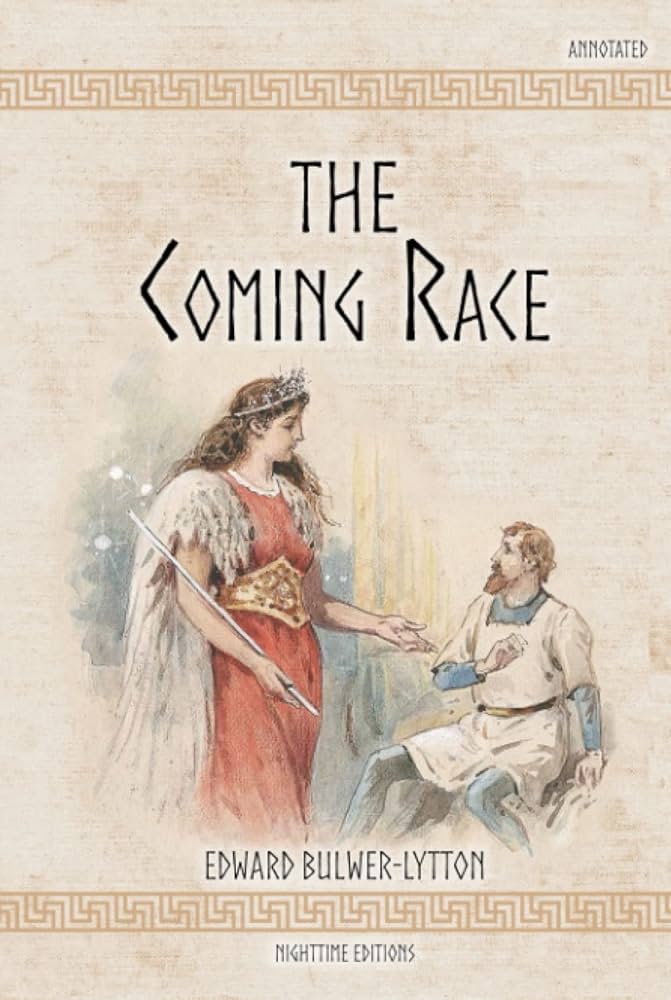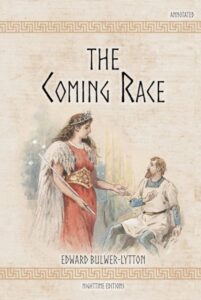Chapter XXVIII — The coming Race
byChapter XXVIII begins along a vast and quiet road where tension lies hidden beneath every word exchanged between Taee and the narrator. Though the path once led to wonder, it now holds the weight of finality. Taee speaks with calmness that unsettles, revealing that the community’s ruling has been handed down—termination, not as punishment, but as necessity. The logic of the Vril-ya is presented as unshakable, where preserving their social integrity overrides any sentiment. To them, one life means little in the grand weave of perfection. But to the narrator, that life—his own—still matters deeply.
The calmness with which Taee addresses death is not indifference, but a reflection of how deeply rooted his people’s beliefs are. Death, to them, is not a tragedy but a transition that bears no sting. Yet the narrator cannot embrace this view. His heartbeat quickens, not out of anger, but from the instinctive grasp of life’s fleeting nature. Where Taee sees resolution, the narrator sees an end, cruelly imposed without empathy. The clash between their views reveals not ignorance, but incompatible truths. And still, both attempt to understand.
Taee’s role is clear. Though still young in age, he is given the responsibility of carrying out the will of his elders, which he regards as sacred. The narrator cannot reconcile this—how a child-like figure, soft-spoken and thoughtful, can wield power over life so effortlessly. The vril staff he holds becomes more than a tool; it becomes a symbol of terrifying control disguised as peace. With that instrument, Taee is expected to extinguish a man’s existence not in hatred, but in efficiency. The horror lies not in malice, but in the complete absence of it. The narrator’s plea is not for justice, but for mercy.
The narrator suggests an escape—a return through the chasm that once delivered him into this world. Yet hope is quickly extinguished. Taee explains that the path has been closed, sealed forever to prevent corruption from seeping back in. That simple sentence feels heavier than any decree. The notion that an entire world could cut itself off so easily from all others terrifies the narrator more than death itself. His body may die, but it is the idea of irreversible separation that wounds him most. In this moment, isolation becomes a kind of sentence.
Faced with this grim certainty, the narrator turns inward. He prays—not for salvation, but for connection. His appeal is not to the logic of the Vril-ya, but to something beyond their reach. It’s a quiet moment, filled with humility. This prayer, unheard by Taee but felt within, is the narrator’s last stand as a man not born of light and vril, but of earth and soul. There is no anger in his plea, only the raw tremor of existence facing its own erasure. Through this vulnerability, he reclaims his humanity.
Something in the narrator’s sincerity reaches Taee. The child, though bred in a world of reason, begins to question whether logic alone is enough. He cannot fully understand fear, but he recognizes it in the eyes of someone who has become his friend. That recognition becomes a seed of doubt, and from doubt, compassion begins to form. Taee promises not a rescue, but a chance. He will speak with his father again, not as a messenger, but as an advocate. For the first time, the idea that even a perfect society might reconsider surfaces with quiet force.
As the two stand beneath the still glow of their alien world, the road behind them no longer feels like a marvel. It feels like the border of everything known and unknown. The narrator’s journey has been more than physical—it has stripped him of pride, peeled back comfort, and forced him to stand before death with open hands. And yet, it has not left him hollow. In the depth of despair, something vital is uncovered: a belief in something greater than control, greater than intellect. A belief that even when surrounded by a superior race, dignity still belongs to the soul.
The chapter closes not with finality, but with waiting. It’s a suspended breath—a moment between possible death and uncertain mercy. The narrator remains a guest, a stranger, and yet something has shifted. A spark of understanding has passed between two beings from different worlds. It may not change the outcome, but it changes the meaning. In a place where power flows without struggle, it is empathy that begins to move the mountain. And in that subtle change, the story bends toward a deeper truth.


